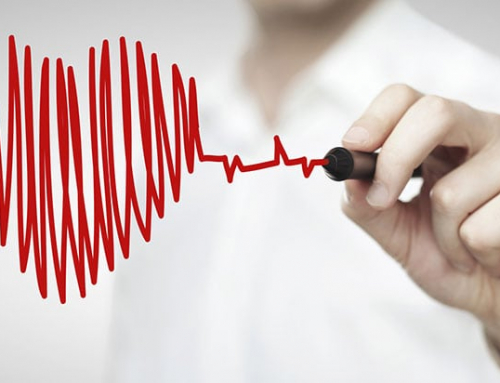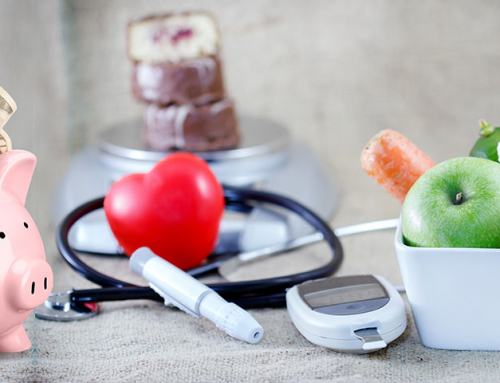This article is part two in a series on American Heart Month. To catch up, please read part one.
Each year as the month of February approaches, we notice red or pink boxes of Valentine’s Day candy lining the stores in the shape of hearts. In conjunction, the American Heart Association has declared February ‘Heart Month’ to help people become more aware of the implications of heart disease.
To continue giving you information on American Heart Month, read on to find out what certain terms mean and how to reduce your risk of heart disease with diabetes.
-
Chest Pain – Not all chest pain indicates a cardiac problem, but you need to be sure that it is not! Chest pain may be caused by bronchitis or pneumonia, especially if you have a persistent cough. It may be caused by asthma, an inflamed muscle or cartilage, a strained muscle, a broken rib, heart burn, gastric reflux or gastritis. Chest pain in a cardiac situation may be accompanied by shortness of breath, squeezing or crushing pain, dizziness, nausea, sweating, jaw pain, shoulder or back pain. It is even possible to have a heart attack or myocardial infarction without any pain called a silent heart attack. It is always critical to rule out cardiac problems first. If you suspect it is cardiac related, call 911 and consider chewing an aspirin (aspirin can help reduce clotting, but if you are allergic or do not tolerate aspirin – do not take any). Check with your physician prior to taking aspirin. There is a website called aspirinpod.com which offers a necklace to carry the aspirin until you need it. Other causes of chest pain could include heart failure or pulmonary edema, which may be life threatening situations. Make sure your health care provider is always aware of any chest pain or discomfort. Women and men can present with different symptoms of a heart attack, so get attention as soon as possible.
What to do – There are many tips that can help you lower your risk of heart disease. Exercise daily and stop smoking. Stand when you can instead of sitting. Try to move around every hour if you have to sit all day. Keep your blood sugars under control. Keep your blood pressure under control. Stay warm during cold, windy winter weather by covering your neck and head. Talk to your physician about low to moderate alcohol intake if you are interested. Eat beans (black, navy, garbanzos, red, or white – green beans do not count) 4 times a week, which according to the National Health and Examination Survey has been shown to lower heart disease by 22%. Multiple research studies state that steel cut oatmeal can lower the LDL due to its high soluble fiber content. Include other foods with high fiber content like fruits and vegetables, use monounsaturated fats including olive oil, eat fatty fish (including salmon) 2-3 times a week, sleep 7-8 hour per night and stay mentally positive. Over 200 studies (analyzed by Harvard University) conclude that “the more optimistic you are the less likely you are to have a heart attack.” The “glass half full” should become your mantra until it becomes second nature. Consider meditation, deep breathing, therapy, volunteering, socializing, getting a pet, prayer or anything which will improve your outlook. There are instances where stress, anxiety and depression can be the primary cause and induce a heart attack.
-
Edema – Edema is considered pressure inside the veins which may cause them to leak fluid (blood plasma that is mostly water) and enter other tissues nearby. The fluid can pool in the ankles, legs, abdomen or lungs and may be caused by heart, kidney or liver disease. Depending on the situation the edema may resolve on its own or remain a serious problem. There are many reasons for edema or fluid retention including excessive heat, long plane rides, hormone fluctuations, pregnancy, sitting with your legs down for long periods of time, legs crossed or even swinging your arms during a long walk. As long as the condition resolves in a day it is generally not a problem; during sleep the extra fluid can be absorbed. A cause for this may be related to the valve in the deep veins that resists the blood returning to the heart, which makes fluid build in the legs and feet. Certain medications may cause edema including non-steroidal inflammatories like Aleve or Advil, diabetes medications called Avandia or Actos (rarely prescribed now due to multiple complications), and blood pressure medications including ACE inhibitors or calcium channel blockers. Always check with your health care provider to find out the cause and do not assume what it may be. Swelling or edema becomes a real problem when it continues, gets worse, includes shortness of breath, a cough or chest pain. This could be heart failure or pulmonary edema which can be life threatening if not treated immediately. The swelling occurs because the heart is too weak to pump the blood and fluid accumulates in the abdomen, lungs or legs causing shortness of breath.
What to do – Always evaluate these conditions with your doctor and do not second guess any situation with edema! Restrict sodium intake to the recommended AHA guideline of 1200-1500 mg a day. Try to keep feet elevated at least 90% when you are sitting. Move your feet around often include doing ankle rolls and toe lifts. Stay hydrated with plain water. Do not cross your legs except at the ankles. Consider supportive socks or special hose if you are flying or standing for long periods of time. Your physician may prescribe a diuretic or water pill if other measures do not work. Always follow your physician’s orders.
-
Palpitations – Although more common in women, men may experience palpitations as well. It generally feels like a fluttering, fast heart beat, intense pounding or skipped beats which can make you light headed, anxious, dizzy or cause fainting. Many times palpitations occur due to life style factors including dehydration, anxiety, stress, menopause, caffeine, or OTC decongestants/cold medications. Palpitations can also be caused by hyperthyroidism or high thyroid hormones. Palpitations can be caused by an arrhythmia or abnormal heart rhythm which may indicate a serious electrical problem. Always consult your physician and never take a chance with an abnormal or irregular heart beat; they may perform an electrocardiogram, Holter monitor or other cardiac test. Atrial fibrillation is a common arrhythmia in people with diabetes and must be monitored by a physician who could prescribe blood thinners like Coumadin or Pradaxa for treatment. This arrhythmia can increase the risk of blood clots which may cause a stroke.
What to do – Always get checked by a physician when you feel fluttering, palpitations or any irregular heart rhythm. Limit caffeinated beverages and stay completely away from energy drinks. Limit your alcohol intake to one or less drinks per day. Do not smoke. Stay hydrated with plain water. Be aware that cough and cold remedies may cause increased blood pressure and palpations. Try to manage stress and anxiety with techniques including deep breathing, meditation or exercise. Talk to your physician if you are going through hormone changes which may require a supplement for a short time.
Heart disease is still a huge problem in our country but levels are decreasing as we change our lifestyles, similar to the way we treat and control diabetes. The good news is that these conditions are chronic but very controllable.
NOTE: Consult your Doctor first to make sure my recommendations fit your special health needs.






Leave A Comment